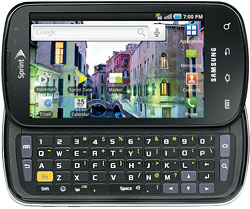
When Samsung’s Android-powered Galaxy S makes its U.S. debut in the coming months, it will do so as five different phones tailored for five different carriers.
AT&T, Sprint, T-Mobile, Verizon and U.S. Cellular will all support a Galaxy S device, though the handset will be renamed and recast slightly for each wireless company.
On AT&T, it will be the Samsung Captivate; on Sprint, it will be the Samsung Epic 4G; the Samsung Vibrant will be the version for T-Mobile; the Samsung Fascinate will be Verizon’s version; and U.S. Cellular has yet to declare a distinct name.
Versions of the Android 2.1-powered handset from AT&T, Sprint and Verizon are due in the coming months; pricing has not yet been announced. U.S. Cellular’s version is due in the fall, while T-Mobile’s device will be available July 21 priced at US$199.99 with a two-year contract; preorders will be accepted starting July 1.
A Copy of Avatar
Though small differences will distinguish the five phones, many features will be consistent across them.
A 4-inch, 800-by-480 Super AMOLED display is one such feature, as is a 1GHz Cortex A8 Hummingbird Application Processor. A 5-megapixel camera and access to social network status updates on Samsung’s “social hub” are also part of all carriers’ packages.
Distinguishing features, on the other hand, will include multiple color options along with a copy of Avatar on T-Mobile’s version and AT&T-specific apps including AT&T Navigator on its version.
‘Home Run’ or ‘Confusing Mess’?
“This will either be one of the biggest home runs in wireless history, or it will be a confusing mess,” telecom and wireless analyst Jeff Kagan told LinuxInsider.
While a leader in the smartphone space, Samsung “just cannot seem to break through the noise of Apple and Google,” Kagan added. “As much as they are growing and getting better, they still are not getting attention from customers or the media.”
That, indeed, may be part of the motivation for Samsung’s multicarrier move, Kagan opined.
“I think Samsung hopes to wow the marketplace and get on everyone’s radar,” he said.
‘A Good Strategy’
“I think it’s a good strategy, in the sense that most phones are very operator-specific, so this way a variety of people, maybe a group that are friends, can all purchase the same phone even though they all may be on different operators,” In-Stat analyst Allen Nogee told LinuxInsider.
“On the other side, if you were a wireless operator with limited advertising dollars to spend, would you spend it promoting a phone all your competitors also had?” Nogee pointed out. “Most likely not, and without promotion and operator support, phones don’t sell. Just ask Google about their Nexus One about that.”
Nevertheless, the move could represent the beginning of a new trend among Android devices, Nogee added.
‘Operators Like It That Way’
“The problem is there is an almost daily barrage of new phones users are exposed to, and the number of features on each that differentiate one model from the next is decreasing,” he explained. “Operators have tried to highlight just a few models, and some have had success, like Verizon and the Droid, but if anything, the model turnaround seems to even be increasing.”
Accessory manufacturers, meanwhile, “are getting frustrated because by the time they make a case or specific features for a model, a new model appears,” he added.
Though the iPhone has kept its identity and high sales, meanwhile, “the Android group of phones is much more diverse,” Nogee pointed out. “So it seems that phone manufactures like Samsung want to keep phones consistent across operators.”
In addition to displeasing operators, who likely won’t be as excited if this move does become a trend, another result could be consumer confusion, he pointed out.
Of course, “operators like it that way,” he concluded. “Again, they want unique offerings — even if it is the same phone, it will have a different name. But how long before they run out of phone names?”
‘Suddenly This Is a New Marketplace’
Wireless has been around for more than a quarter century, and smartphones have been around a decade or two, Kagan pointed out. With the recent explosion in smartphones, however, “suddenly this is a new marketplace,” he said.
“There is no more rule book; suddenly non-wireless companies like Apple and Google are leading in the wireless space,” Kagan pointed out.
As a result, marketing, advertising and public relations are now all “up for grabs,” Kagan explained. “The rules we thought we knew are no longer valid. We will continue to be surprised by new moves.
“It will be interesting to see if Samsung can punch their way onto the consciousness with this new and very different move,” he concluded.




















































